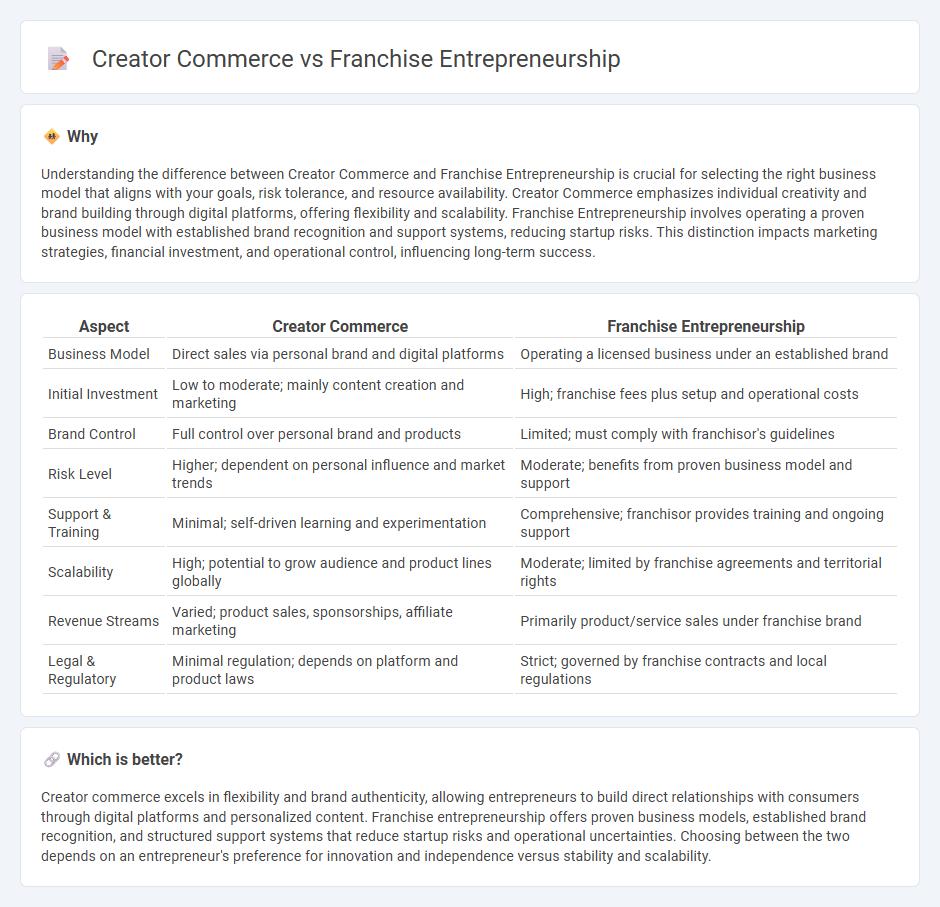
Creator commerce empowers individual entrepreneurs to build personalized brands and directly engage with niche audiences through digital platforms, leveraging content creation and social media marketing for scalable growth. Franchise entrepreneurship offers a structured business model with proven operational systems, brand recognition, and ongoing support, reducing startup risks but limiting creative control. Explore the key differences and benefits of each approach to determine the best fit for your entrepreneurial journey.
Why it is important
Understanding the difference between Creator Commerce and Franchise Entrepreneurship is crucial for selecting the right business model that aligns with your goals, risk tolerance, and resource availability. Creator Commerce emphasizes individual creativity and brand building through digital platforms, offering flexibility and scalability. Franchise Entrepreneurship involves operating a proven business model with established brand recognition and support systems, reducing startup risks. This distinction impacts marketing strategies, financial investment, and operational control, influencing long-term success.
Comparison Table
| Aspect | Creator Commerce | Franchise Entrepreneurship |
|---|---|---|
| Business Model | Direct sales via personal brand and digital platforms | Operating a licensed business under an established brand |
| Initial Investment | Low to moderate; mainly content creation and marketing | High; franchise fees plus setup and operational costs |
| Brand Control | Full control over personal brand and products | Limited; must comply with franchisor's guidelines |
| Risk Level | Higher; dependent on personal influence and market trends | Moderate; benefits from proven business model and support |
| Support & Training | Minimal; self-driven learning and experimentation | Comprehensive; franchisor provides training and ongoing support |
| Scalability | High; potential to grow audience and product lines globally | Moderate; limited by franchise agreements and territorial rights |
| Revenue Streams | Varied; product sales, sponsorships, affiliate marketing | Primarily product/service sales under franchise brand |
| Legal & Regulatory | Minimal regulation; depends on platform and product laws | Strict; governed by franchise contracts and local regulations |
Which is better?
Creator commerce excels in flexibility and brand authenticity, allowing entrepreneurs to build direct relationships with consumers through digital platforms and personalized content. Franchise entrepreneurship offers proven business models, established brand recognition, and structured support systems that reduce startup risks and operational uncertainties. Choosing between the two depends on an entrepreneur's preference for innovation and independence versus stability and scalability.
Connection
Creator commerce leverages personal brands and digital platforms to build direct-to-consumer businesses, driving rapid market entry and customer engagement. Franchise entrepreneurship scales these proven business models through replication and standardized operations, reducing risk and enabling expansion. Both approaches harness entrepreneurial innovation and brand value to capitalize on market opportunities efficiently.
Key Terms
Franchise Entrepreneurship:
Franchise entrepreneurship offers a proven business model with established brand recognition, operational support, and reduced risk compared to starting an independent business. Franchisees benefit from comprehensive training, marketing assistance, and access to a loyal customer base, which accelerates growth and profitability. Explore how franchise entrepreneurship can provide a strategic advantage for aspiring business owners seeking stability and scalability.
Franchise Agreement
Franchise entrepreneurship leverages a Franchise Agreement to establish a legally binding relationship, ensuring brand consistency and operational guidelines across all locations. Creator commerce, in contrast, centers on individual content creators monetizing their audience without formal franchise contracts, focusing more on personal branding and direct customer engagement. Explore in-depth distinctions between franchise agreements and creator commerce business models to optimize your entrepreneurial strategy.
Brand Consistency
Franchise entrepreneurship emphasizes strict brand consistency through standardized operations, maintaining uniform customer experiences and reinforcing brand identity across all locations. Creator commerce prioritizes personal brand authenticity, often adapting content and products to audience preferences while striving to keep core brand values intact. Explore how balancing brand consistency impacts growth strategies in both models.
Source and External Links
Franchising - Wikipedia - Franchise entrepreneurship is a business expansion strategy where a franchisor licenses its brand, know-how, and business model to a franchisee, who pays fees and complies with obligations to operate under the franchisor's established system.
The Franchise Business Model: Everything You Need to Know | tulane - Franchise entrepreneurship involves an independent business owner (franchisee) operating under the franchisor's brand and system, typically paying upfront fees and royalties, with the common model being the business format franchise where operations follow franchisor's guidelines.
What is a Franchise - International Franchise Association - Franchise entrepreneurship is a method of business growth where franchisors license their trademark and business system to franchisees, providing training, marketing, and support to maintain brand standards and operation quality.
 dowidth.com
dowidth.com